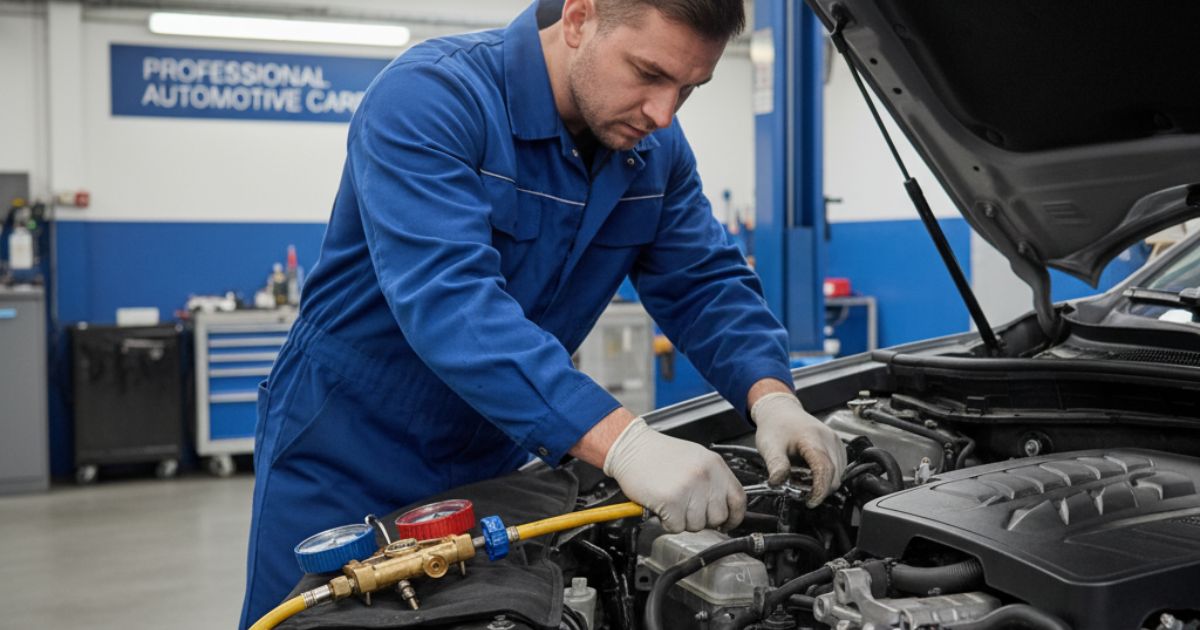When your car’s air conditioning system starts acting up, whether it’s blowing hot air, making strange noises, or simply not cooling as it should, it can turn even a short drive into an uncomfortable experience.
Car AC repair is one of the most common automotive services, and knowing what to look out for can save you both time and money. In this guide, we’ll explore the most common car air conditioning problems, what causes them, and practical tips for fixing or preventing them.
Why Car AC Systems Fail
Your car’s air conditioning is more than just a luxury, it’s essential for comfort and even safety, especially in hot weather, when visibility can be affected by foggy windows. However, like any system, it is prone to wear and tear. The most common causes of AC issues include:
- Refrigerant leaks – Small leaks in pipes or seals cause the AC to lose cooling power.
- Car AC compressor issues – A failing compressor won’t circulate refrigerant properly.
- Electrical faults – Damaged wires or fuses can interrupt the system.
- Blocked or dirty filters – Dust, pollen, and debris reduce airflow and cooling efficiency.
- Evaporator or condenser problems – Corrosion, clogs, or physical damage can affect cooling performance.
Identifying the issue early can prevent bigger (and more expensive) repairs down the road.
Common Car AC Problems and Fixes
1. Car AC Not Cooling Properly
One of the most frequent complaints drivers have is that the car air conditioning is not cooling. This is often caused by low refrigerant levels due to leaks.
Quick Fix: Have a professional perform an AC re-gas service. If the refrigerant leaks again soon after, the leak needs to be located and sealed.
2. Car AC Blowing Hot Air
If your AC suddenly switches from cold to hot air, the problem could be with the compressor or a blocked condenser.
Quick Fix: Check for visible blockages in front of the radiator and condenser (like leaves or dirt). If the issue persists, the compressor may need professional attention.
3. Strange Noises from the AC
A grinding or squealing sound often points to car AC compressor issues or worn-out belts.
Quick Fix: Have the belts inspected and replaced if necessary. Ignoring noisy components can lead to costly breakdowns.
4. Bad Smells from Air Vents
If your AC smells musty, mould or bacteria may be growing in the evaporator. This usually happens when moisture lingers in the system.
Quick Fix: Run the fan without AC for a few minutes before turning the car off. For persistent smells, use an antibacterial cleaner or ask for a professional cleaning service.
5. Water Leaks Inside the Car
If you find water pooling on your floor mats when the AC is running, the drainage tube may be clogged.
Quick Fix: Clear the drainage tube to allow condensation to flow out properly. A mechanic can help if you can’t access it yourself.
How Much Does Car AC Repair Cost in the UK?
The cost of car air conditioning repair depends on the fault:
- Re-gassing (recharging refrigerant): £60–£100
- Fixing small leaks: £150–£250
- Replacing the compressor: £300–£800
- Full system replacement: £1,000+
Getting a proper diagnosis early helps avoid higher repair costs later.
Signs Your Car AC Needs Repair
Not sure if your system needs attention? Watch for these warning signs:
- Weak airflow from vents
- AC takes too long to cool
- Car AC blowing hot air
- Unusual noises (rattling, squealing)
- Foul odours from vents
- Visible refrigerant leaks under the car
If you notice any of these, it’s best to book a car AC repair service near you.
Car AC Maintenance Tips
Preventive maintenance can extend the lifespan of your AC system and reduce repair bills. Here are some practical tips:
- Run the AC regularly – Even in winter, run it for a few minutes every couple of weeks to keep seals lubricated.
- Replace cabin filters – Dirty filters restrict airflow and put extra strain on the system.
- Keep the condenser clean – Remove leaves, dirt, and debris from the front of the car.
- Service your AC every 1–2 years – Regular check-ups can identify leaks or wear before they get worse.
- Use the AC defogger – This helps remove excess moisture, preventing mould build-up.
DIY Car AC Troubleshooting Guide
Before heading to a garage, try these quick checks:
- Step 1: Ensure the AC settings are correct (temperature, fan speed, recirculation mode).
- Step 2: Listen for the compressor clicking on when AC is activated. If not, there may be an electrical issue.
- Step 3: Check airflow from all vents. Weak airflow may indicate a clogged filter.
- Step 4: Look under the car for signs of refrigerant leaks (oily residue).
- Step 5: If you smell something unusual, turn off the AC and run the fan to dry out the system.
If these steps don’t resolve the issue, it’s best to see an AC repair expert.
Conclusion
Your car’s air conditioning is more than just a comfort feature; it’s essential for safe and pleasant driving. From car AC not cooling to compressor problems or blowing hot air, these issues are common but manageable if caught early. By understanding the most common car AC problems, learning basic troubleshooting, and keeping up with regular maintenance, you can avoid costly repairs and ensure your car stays cool all year round.
Whether you need a quick re-gas, a leak fix, or full car AC repair service near you, acting fast will keep both you and your vehicle in top condition.





